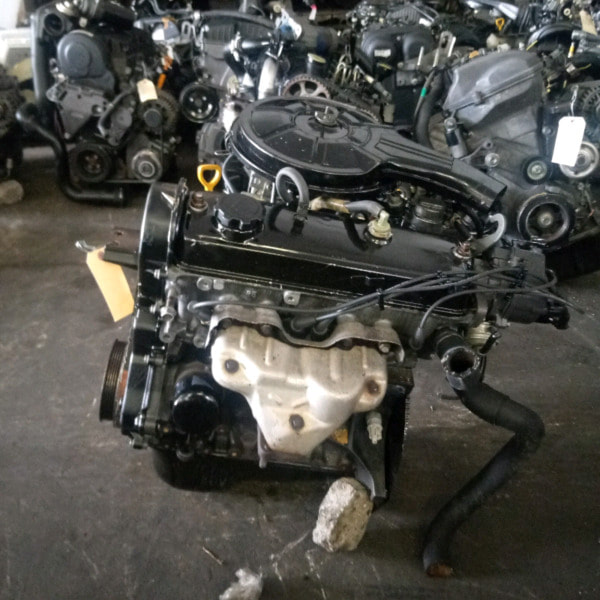Come back when traveling: Toyota Tazz Engine for Sale, Ideal Offers Wait For
Come back when traveling: Toyota Tazz Engine for Sale, Ideal Offers Wait For
Blog Article
Engine Buying Professional Tips on Choosing the Right Engine for Your Certain Demands
Selecting the appropriate engine for your details requirements includes a complex interaction of aspects that go beyond plain horsepower figures. By diving right into the complexities of power versus efficiency, reviewing fuel ratings, and budgeting for lasting expenses, one can really maximize their engine option.
Power Vs. Effectiveness: Locating the Equilibrium

When picking an engine, it is crucial to strike an equilibrium between power and effectiveness to satisfy your specific needs efficiently. Power describes the engine's capability to generate energy for propulsion, determining variables like velocity, hauling ability, and overall performance (Toyota Tazz Engine For Sale). On the various other hand, performance connects to how well the engine makes use of fuel to produce power, impacting factors such as gas economic climate and environmental kindness
Accomplishing the right equilibrium between power and effectiveness is important due to the fact that an engine that is also effective may eat excessive gas, resulting in greater operating expense and unnecessary stress on the environment. On the other hand, an engine that prioritizes effectiveness over power may lead to sluggish efficiency, specifically in demanding scenarios like hauling hefty tons or driving uphill.
To make an educated decision, think about factors such as your common driving problems, the intended use the vehicle, and your individual choices. By evaluating your concerns and needs, you can choose an engine that strikes the perfect balance in between power and effectiveness, guaranteeing optimum performance while reducing ecological influence and operating expense.
Recognizing Engine Size and Type

Typical engine types consist of inline engines, V engines, and rotating engines, each with its special advantages and downsides. Understanding the interplay between engine dimension and kind is essential in picking an engine that lines up with your certain needs and priorities, whether it be power, performance, or an equilibrium of both.
Consider Your Car's Requirements
If you are looking for an engine for a heavy-duty truck that will certainly be made use of for towing, you will certainly need a powerful engine with high torque capacities. On the other hand, if you are selecting an engine for a small auto largely made use of for city commuting, fuel effectiveness may be a much more essential factor to consider.

Evaluating Gas Performance Ratings
Evaluating gas official statement effectiveness scores is an essential aspect of choosing the right engine for your lorry, making sure expense savings and ecological sustainability. Gas efficiency scores, commonly measured in miles per gallon (MPG) for gas engines or kilowatt-hours per 100 miles (kWh/100 miles) for electrical engines, show just how far a car can take a trip on a certain amount of gas or electricity. Greater MPG or lower kWh/100 miles worths represent more reliable engines, equating to decreased gas expenses and lower carbon discharges.
Furthermore, contrast various engine options Extra resources within the very same lorry class to recognize the most economical option. Variables such as engine size, weight, the rules of aerodynamics, and hybrid or electric capabilities can all affect fuel effectiveness.
Budgeting for Long-Term Expenses
Purposefully preparing for lasting expenditures is essential when picking an engine, guaranteeing economic sustainability over the automobile's life expectancy. While the preliminary purchase rate of an engine is a significant factor, it is essential to think about the lasting costs connected with upkeep, repair services, and gas usage. Going with a more fuel-efficient engine may have a greater in advance expense yet can lead to substantial financial savings gradually. Regular maintenance, such as oil changes, filter replacements, and tune-ups, is crucial to maintain the engine running efficiently and successfully, reducing the risk of pricey fixings down the line.
Furthermore, investigating the accessibility and expense of replacement components for the chosen engine is crucial in budget plan preparation. Engines with budget-friendly and easily offered components can dramatically impact lasting maintenance expenses. Furthermore, thinking about the engine's toughness and anticipated life expectancy can help prevent unanticipated replacement prices in the future. By meticulously budgeting for these lasting expenses and factoring them into the decision-making process, people can choose an engine that not only meets their immediate demands but also remains affordable throughout its life-span.
Verdict
To conclude, selecting the ideal engine for your particular requirements needs balancing power and performance, comprehending engine size and kind, considering your automobile's demands, evaluating fuel performance scores, and budgeting for long-lasting prices. By meticulously taking into consideration these factors, you can make sure that you pick an engine that fulfills your demands and offers optimal efficiency for your car.
To even more improve the option process of an engine that strikes the optimum equilibrium between power and effectiveness, it is vital to dive right into the details of comprehending engine size and kind. Engine size refers to the complete volume of air and fuel that can be pressed with the engine cylinders. Typical engine types include inline engines, V engines, and rotary engines, each with its one-of-a-kind benefits and downsides. Comprehending the interaction in between engine dimension and type is essential in selecting an engine read this post here that lines up with your certain demands and top priorities, whether it be power, effectiveness, or an equilibrium of both.
Gas efficiency scores, normally determined in miles per gallon (MPG) for gasoline engines or kilowatt-hours per 100 miles (kWh/100 miles) for electrical engines, indicate just how much a vehicle can travel on a certain quantity of gas or electrical power.
Report this page